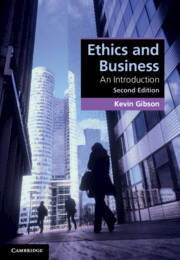Book contents
- Ethics and Business
- Cambridge Applied Ethics
- Ethics and Business
- Copyright page
- Dedication
- Contents
- Preface
- Acknowledgments
- 1 An Overview of Business Ethics
- 2 Insights from Ethical Theory
- 3 Capitalism and Its Ethical Implications
- 4 Responsibility
- 5 Autonomy
- 6 Justice and Equality
- 7 Rights
- 8 Beneficence
- 9 Business and the World
- Select Bibliography and Further Reading
- Index
9 - Business and the World
Published online by Cambridge University Press: 22 December 2022
- Ethics and Business
- Cambridge Applied Ethics
- Ethics and Business
- Copyright page
- Dedication
- Contents
- Preface
- Acknowledgments
- 1 An Overview of Business Ethics
- 2 Insights from Ethical Theory
- 3 Capitalism and Its Ethical Implications
- 4 Responsibility
- 5 Autonomy
- 6 Justice and Equality
- 7 Rights
- 8 Beneficence
- 9 Business and the World
- Select Bibliography and Further Reading
- Index
Summary
Business impacts the world we live in by affecting our environment, living creatures, and our heritage. Often these costs are externalized onto remote populations or future generations. This chapter begins with an emblematic case about rare earth minerals that are vital to modern technology but which, despite “green” initiatives, are also difficult to refine or recycle, and therefore create pollution. The term “sustainability” is closely analyzed, as it conflates the senses of “maintaining our current production and consumption levels” with “maintaining resources in the face of rising prosperity and consequent depletion,” each with widely divergent implications. Arguments promoting intrinsic value of the biosphere are assessed, as are conservation claims about the broad “web of being” and potential climate change. Monetization, the technique that asks hypothetical questions to assess environmental preferences, is presented and critiqued. Triple bottom line accounting is outlined, and the amount of waste we produce is also discussed. The final case looks at the potential effects of large-scale industrial farming and its implications for the environment and the global food chain.
Keywords
- Type
- Chapter
- Information
- Ethics and BusinessAn Introduction, pp. 245 - 280Publisher: Cambridge University PressPrint publication year: 2023

